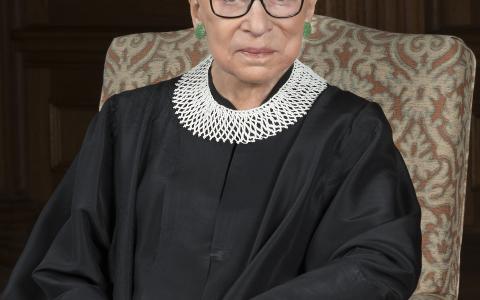
The death of Supreme Court justice Ruth Bader Ginsburg hit the weekend news cycle like an earthquake, leaving pundits to ponder the shape of a post-RBG legal landscape.
It isn't about the law any more. Because the Supreme Court has been politicized, the real implications will be political. And because the market has been unable to resist the pull of politics, Wall Street will feel the change in the atmosphere too.
The next 43 days were always going to be a rollercoaster. Now the rhetoric looks likely to pull us all into the drop whether we lined up for the ride or not. That includes you, me, your clients and their friends.
Politics at the center
Most of the guesswork and speculation has revolved around RBG's successor and the process through which someone gets nominated and confirmed. These are political questions with political stakes.
It looks like Trump will rush a nominee to the Senate, but he says a lot of things that never actually happen. Until we see the name move to Capitol Hill, it's all just the stuff of Washington TV.
Theoretically, the Republicans who refused to consider Merrick Garland when Antonin Scalia died in 2016 have a moral principle that resists filling a vacancy in a presidential election season.
We'll just have to see. In practice, some have said they will uphold that rule, but those who call the shots are eager to get the seat filled.
After all, Trump could win or lose. If they delay and he loses, Biden fills the seat.
But the 2020 calculus couldn't be that simple. Postponing the gratification of filling another Supreme Court vacancy motivates the Republican base. It raises the stakes.
On the other hand, Democrats are now extremely engaged. If the Senate doesn't delay, blue voters want to punish vulnerable candidates and push Biden into the White House.
Pack the court, lose the election. The math is delicate and will evolve over the coming weeks as the polls fluctuate.
Either way, it takes at least a few weeks to move a Supreme Court nomination through the process. We won't have real clarity until mid-October.
Meanwhile, life will go on. The Court was getting set for another year and will go on with eight members until the vacancy is filled.
The calendar wasn't especially relevant to Wall Street. No big banks are arguing cases this year. Instead, it's all about Obamacare and a lot of lawsuits against the federal government itself.
How well they can argue in a 4-4 split remains to be seen. Maybe they'll find common ground. Or maybe the de facto majority will simply set the consensus whether RBG is there or not.
No "left wing" justice will be named before the election. If someone comes in from the right, the dynamics really don't change.
Not about the law or the market
She was an icon to many, with a fierce and penetrating legal intellect. After 27 years as one of the nine final arbiters of U.S. law, her absence will change the direction of society in endless subtle and sweeping ways.
For some, losing her voice on the Supreme Court will hurt. But that's always how the law works. Court cases are named as adversarial relationships: Roe "versus" Wade.
Someone will win and someone will lose. The judge or judges will decide. If we can't trust their legal insight, the system is broken.
RBG voted with the majority 76% of the time between 2011 and 2018. She found common ground with conservative justices like Clarence Thomas and Neil Gorsuch more than half the time.
Maybe a pure ideologue will replace her. Otherwise, the life of the court will go on. They're interested in the kinds of constitutional issues that drove RBG's legal thought.
It was about the definition of equality under the law for her and in particular what that means for women. She wasn't really motivated by economics.
Her rulings weren't favorable or unfavorable to Wall Street . . . again, she was usually in the majority, and when she wasn't, her dissent was noted but didn't become legal precedent.
The fight over who succeeds RBG is probably not going to be immediately favorable or unfavorable to the market. Her absence won't change the dynamics of capital.
But we're in the pundit business, so here we go: capital will be hyper sensitive until these questions are resolved.
RBG's absence is a fact of human life. This is why we all ultimately choose to retire or keep working until we die. It's why we groom successors to carry on our work when we're gone.
She undoubtedly had her eye on younger judges she wanted to fill her chair. Maybe we'll meet one or two some day.
But she didn't get to pick them. That's for professional legal practices, not the judiciary. Her succession plan was a factor of politics.
And in a world where everything becomes politics between now and November, politics drives the market.
Things ahead looked bumpy before. They're going to get more volatile. Remember the wild overnight trading in 2016? Buckle up.
The Senate was already in play. The White House was already in play. Those realities don't change. And the Supreme Court was always going to evolve over the generations.



